Unconformed Education: A Personal Deep Dive
From commitment and "politics" to schedules, books, and the long game
For those of you who prefer to read off paper rather than the screen, we have converted the post into an easily printable pdf file. Remember to come back and share your thoughts and comments! You can access the file here:
“Whatever an education is, it should make you a unique individual, not a conformist; it should furnish you with an original spirit with which to tackle the big challenges; it should allow you to find values which will be your roadmap through life; it should make you spiritually rich, a person who loves whatever you are doing, wherever you are, whomever you are with; it should teach you what is important, how to live and how to die.”
—John Taylor Gatto
A young man begins independent life by selling fish from his bicycle. He is dyslexic and has no degrees. Any guess who he is now? Ingvar Kamprad - founder of IKEA and worth 31 billion.
A surfer bum and horrible student joins forces with a homeschooled born-again Christian. What was their achievement? Mapping the human genome.
A four-year old learns his first lesson of independence when he gets dropped off in an unfamiliar London neighbourhood by his mother and is told to find his way home. Any guess who this high school drop-out is now? Sir Richard Branson, who recently launched into space on his own Virgin Galactic rocket.
John Taylor Gatto1 offers these real life examples to prompt us to question our assumption that people who are self-educated, or have failed to achieve success in traditional systems, are doomed to failure. Gatto was a teacher for 30 years in some of the worst, and some of the best, schools in Manhattan. He was named New York City Teacher of the Year three consecutive years, yet he received these awards not because he was a star within the school system, but because he was a saboteur. He did not follow any of the standard curricula; he bent the rules wherever he could; he worked around the system to provide students with an education that recognized them as unique individuals, not conformists.
“Unconformed Education” is experiencing a rise in popularity both in the home and the multitude of private schools burgeoning across the continent:
introduces a collection of schools, “which are not only forming their students in theology and/or the liberal arts, but also require either learning a trade or working in one on-campus during their time as part of their core programming.” ’s article Inside the New Wave of Old-School Education for details the new popularity of classical schools:While this time-honored approach to education has fallen out of favor in recent decades—as many American schools have prioritized ideology and equal outcomes over excellence—it is now making a big comeback across the country. This is driven not only by parents’ growing realization of the old system’s academic failures but a sense that contemporary campus culture lacks much in the way of moral vision.
In today’s post we are not going to be arguing about the superiority of one educational system over another. While we do have our leanings and preferences, what we really want to encourage more than anything, based on over fifteen years of home educating experience, is the active involvement of parents in their children’s education, toward discovering and supporting their child’s unique learning potential.
This uniqueness is especially important in an increasingly technological age, where the emphasis on efficiency and utilitarianism can infiltrate the atmosphere of the regular school system, and cause us to overlook or override a child’s originality.
Resisting the Machine can take a myriad of forms, but it must necessarily come from individuals, like you, or me, to inspire hope in our children that they are not mere cogs in the system, but have agency to carve a future.
Please note: While this post will focus on home education, we would love to hear from readers who are pursuing other forms of unconformed education as well! This could include educational choices you are making within your family or in your own life as an adult learner. Please share your comments below!
I (Ruth) have called this post a personal “deep dive” in an unconformed education, partly as I soon realized I had an ocean of material to share based on our family’s educational journey (thanks to
for prompting this endeavour with her note!).For added context: Peco and I have three children who were homeschooled from the beginning. Our daughter is entering her third year of university this fall; our older son is entering grade 12; our younger son is entering grade 7. For more than a decade I have founded and coordinated various homeschool programs in our community including an early education co-op, hands-on science classes for middle and high school students, spelling bees, speed math, Charles Dickens and classic vocabulary, Latin, and public speaking programs. From 2021-23, I had a weekly radio spot as homeschool advisor, reporting on homeschool and educational news in the context of the rapid changes and upheaval in our society.
Once I started collecting my thoughts on paper, I realized that I could not possibly sum them up in a single post…
Today I am thus sharing introductory thoughts for families starting out on their educational journey and will not cover middle school/ high school topics in this piece.
For readers who would like to learn more about home education, I am introducing a new Unconformed Education section which will include articles on: curriculum recommendations, sample schedules, homeschooling high school, online schools, keeping records and transcripts, starting your own homeschool co-op and more.
If you would like to follow along, turn on your notifications for Unconformed Education here:
For monthly paying subscribers, I will be hosting a “Curriculum Show and Tell” during the month of August, where I will be sharing my favorite curricula for various ages, and will also invite you to share yours!
Relationship & Commitment
I asked our youngest what advice he would give parents who are starting out with homeschooling. He reflected briefly then said simply, “They should take time to connect, sit on the couch together and read, so that they can be happy when they do school together.” His advice was spot on. Learning can only happen when your heart is in the right place.
Relationship is at the core of all learning, whether it be in a home setting or at school. You could have the most splendid, well-researched, award-winning curriculum, but if you are frustrated, angry, or impatient with each other, it will be of no use at all. Thus, at times resetting the mood with a bit of reading time on the couch, sharing a snack in the garden, or going for a brief walk, will produce better learning outcomes than pushing through academic tasks in frustration.
Spending ample time with your child will allow you to get to know them. Each child learns in a unique way. Observe what fascinates them, what frustrates them. Offer them encouragement in the topics they are passionate about while stretching them in the areas where they need extra support. The bond you form by spending time together when they are young, will pay tenfold dividends when they are teenagers.
Your spouse is another essential component in the relationship dynamic. Take time together to process the day’s challenges and highlights. Resolve differences to ensure that you are on the same page with regard to your educational approach. If you feel pressure to demonstrate that enough learning is happening, it can stilt your teaching and leave you feeling stressed out.
If you are a praying family, pray together, both at the start of the day and at the end. It strengthens your relationship to each other, is an opportunity to open hearts in the right direction, and also allows you to let go of any hard feelings.
Whether it is in marriage, taking a leap in bouldering, or educational decisions for your child, your commitment needs to be full. A wavering heart finds continuous doubt, anxiety, and fault. Importantly, your children will register your uncertainty and may begin to mirror it.
There will be tough days (or weeks) but there will be wonderful ones as well. It is important to step back and examine whether an issue is part of a natural fluctuation of moods, or whether it is something that needs to be altered in the curriculum, schedule, or approach.
Yet you can only truly determine if a particular approach to education—like classical education, “open source” learning2, private schooling, etc.—is a good fit with your family if you commit to it fully. In my experience, a commitment of at least one school year should be enough to give you a clear idea if a learning approach is working. There might exceptions, of course—sometimes it becomes quickly clear that things aren’t what you’d hoped. Still, if you don’t commit long enough, you might not be allowing your child enough time to settle in and adapt to a program to reap the potential benefits.
The Politics
Choosing an unconformed educational path can prompt others to react defensively, because they might think it implies there is something wrong with their own family’s choice. I always emphasize that this form of education fits well with our family, without judging more conventional choices—like public school. I actually greatly admire (and I don’t hesitate to tell people this) classroom teachers, public or private, who have a tremendously difficult task in managing bursting rooms full of students with different needs.
A conversation that I have had countless times might go like this:
“So why do you homeschool?”
“When it was time to send our daughter to school we considered all the different educational choices —public, private, Montessori, French immersion, etc.— and we decided that home education is the one that fit best with our family.”
Don’t feel the need to defend yourself or explain your choice. Where possible, try to give a simple answer:
“The kids have more time to learn and more time to play.”
“The kids get better academics and better socialization”.
“Socialization happens around people of all ages, from babies to seniors, rather than children that are exactly their age.”
“The kids can learn subjects that are not taught in school (Latin, German, Chinese, Norse mythology, Astronomy, Arthurian Legend, Trial Law, Economics, etc.) and can proceed at their own pace.”
Most importantly, let time speak for you. Trust that skepticism among extended family or friends is often assuaged when they witness that your children are learning and developing well. We have had several family members, who were initially critical, but years later affirmed that they now think we made a great choice.
Part of an unconformed education is educating others about education! There is so much internet misinformation3 and misunderstanding that it’s up to us to show people—through our words and most importantly our lives—the benefits of learning outside the box.
The Choices
Homeschooling books and resources have exploded over the last few years and it can leave one feeling overwhelmed with options. While online recommendations can sometimes be useful, everything sounds like a “must have” or “the best ever” but it could be a complete mismatch for your family (e.g., one math curriculum which received rave reviews was renamed the “kill-me-now” curriculum by our children).
Another reason to be cautious with the cornucopia of online material is that rather than serving to inspire, it can make us feel intimidated. So we may end up feeling inadequate and discouraged (in other words, avoid looking at Instagram posts that make you feel like your house is a mess and you are failing your children).
Here is what has worked for me:
Limit what you read. Stick with three to four staples of writers who you respect, enjoy, and resonate with. Then stop looking. (For my personal favorites, see the Books section below).
If at all possible, seek true inspiration from families you can visit. In your encounters with various home educators, you will likely discover that homeschooling styles are a bit like denominations. Each family is quite convinced of the rightness of their choices and at times it may feel as if they are trying to convert you. Remember that there are as many approaches to homeschooling as there are homeschoolers. Only you can ultimately decide what fits best with your family.
During the summer months, I made a point of visiting homeschool friends who had very different ways of homeschooling. One had a tremendously strict regimen, long study hours, and days filled to the brim with school and outside activities. While I had no desire to adopt this style, it gave me ideas for improving our daily schedule and prompted a couple of curriculum changes.
Another friend stepped away from much book learning and instead involved her daughter in various farming projects. Another had a great system for organizing daily school work into drawers for each child. Yet another introduced me to a splendid language arts curriculum that revitalized our grammar and poetry study.
The advantage of visiting homeschool families is that there is added context: Does the household feel too wild or too tight for you? Do the children seem to share a similar personality/ learning style to yours? Does the mother seem stressed and tired out or does she manage her interactions with relative patience and calm? These are important contextual clues that are missing in online recommendations and curated Instagram posts.
Many of you will be familiar with Susan Wise Bauer, the author of The Well-Trained Mind. I have met families who have almost given up on homeschooling because they felt that they simply could not keep up to the standard laid out in this approach to classical education.
This passage4 is thus one of the most refreshing admissions by Susan Wise Bauer I have come across:
Fast forward (past a lot of parental hair-pulling) to age fourteen. I’m a writer, so grammar is particularly important to me. I drilled my kids in grammar from first grade on. We did grammar drills and grammar exercises. We memorized grammar rules. We diagrammed sentences. We never did not do grammar.
So on the first day of seventh grade, I pulled out the previous year’s grammar book for a quick review.
My son looked at me like a newborn fawn contemplating a bow hunter. He remembered nothing.
“How can you not know what a noun is ?” I demanded.
“Well,” he said, “maybe it’s because we’ve never really done grammar before.”
Thus, rest assured that even the most highly acclaimed homeschool educator, using the best available curriculum, has her moments of feeling inadequate.
The Community
Meeting regularly with other homeschoolers allows families to support each other. When all your friends and family send their children to public or private school it can make you feel alone and “odd”. If you are having a rough day or week, lack of support can lead you to question whether you have made the right choice, whether you are a good enough teacher, whether you are failing your child in some way. When things go wrong at school, one can blame the teacher or the system, but in homeschooling the buck stops with you.
One of the wonderful things a homeschool group offers is other parents who have gone through the same experience, can empathize, and importantly, can provide a reality check. We all have bad days; this is true whether your child is in school or at home.
Experienced homeschoolers are a well of encouragement and advice. These relationships can often serve a valuable mentoring role, teaching new homeschoolers how to face challenges in instruction, scheduling, curriculum choice, or student motivation. Finally, homeschool groups can be a great way to unwind and have some adult time over a hot cup of coffee (in my experience many of these gatherings have turned into great home-baked smorgasbord events).
Our Homeschool Group Experience
When we started homeschooling we did not know any families in our immediate area who had also chosen this route. Many of the groups that we read about were too far away, were more suitable for older students, or were filled to capacity and had no room available. So we decided to start up a new, local group simply by making an announcement on a homeschool group site. We immediately received responses from several families who were interested in getting together and thus our homeschool group started:
Early Years: We started our homeschool journey when our daughter was four years old. There was a lot of freedom in simply meeting for weekly forest walks and outdoor play time. At this point we had around eight families with children all of kindergarten age and it was not convenient to meet in our homes because of the size of the group. We were able to rent a room at a church which we used for story and craft time. Each family signed up for a given week and would plan the activities and prepare the needed materials for the children. The other parents would assist when necessary and each family contributed to the cost of the rental. We would also bring our different curricula so that parents could examine them and would share our experience in using the materials. After about a year, some families decided to leave the group because of the needs of older children, travel distance, or because they decided to enroll their child in public school. This prompted the remaining families to spend some time examining what we shared in common in our vision of homeschooling and allowed us to move forward with a renewed focus toward the elementary school years.
Families may have different ideas of homeschooling and also different levels of commitment to the group. This can pose a challenge when planning activities if families only attend irregularly.
During the early years many families may be trying out the idea of homeschooling but may decide to place their child in school once compulsory school age starts in Grade 1.
Having conversations about why each family is choosing to homeschool can be very helpful in determining the focus for the group.
Elementary Years: During the early elementary years I organized a weekly science group with lessons and experiments and we joined a weekly homeschool gym program. Our family had decided to pursue a classical education approach and invited others to join us for weekly science study in astronomy and later physics concepts. Science is one of the areas of homeschooling which lends itself very well to group study and parents often appreciate conducting an experiment together. This saves time and cost and is also a lot more fun to do together with fellow students.
Organizing a small group yourself has the advantage that you can choose the curriculum and content of the lessons.
Other parents benefit from having some time off and students enjoy spending time together learning.
If you are someone who enjoys teaching, this type of gathering can be a wonderful way to serve your homeschool community; if teaching is stressful for you, you may want to consider taking turns teaching lessons.
I’ll be sharing more on how to start your own homeschool co-op and creating group guidelines in the Unconformed Education section. You can add notifications for these posts here.
Time & Developing Uniqueness
Leisure in education means taking time to digest, focusing on things that aren’t necessarily going to advance your career or help you check off the points on the curriculum map because they are worth digesting, focusing on, or simply abiding within.
from Common Arts Education by Christopher Hall
Given our society’s preoccupation with teaching children at ever younger ages to ensure that they are “ahead”, many people are surprised to learn that in Switzerland—a country with very high educational standards—students are not taught to read, write, or do math in kindergarten at all. Instead this early stage of childhood is focused on free play, developing social skills, spending time in nature, exploring, and creating. Reading, writing, and math are only started in elementary school around age six to seven.
Starting off with a “simple and sane” plan (see below under Schedule) also teaches your child to approach learning in an unhurried way. It allows them time to develop private uniqueness. Time to forge self-reliance. Time to be bored and to create.
Don’t overcommit to outside activities. It is tempting to sign up for an array of soccer, swimming, chess, piano, or language lessons, but too many can turn your life into a harried frenzy.
In their free time, each of our children has developed completely different passions over the years. As parents we simply either offered them the materials they needed to pursue their interests (paper, ingredients, tools, rc motors, wood, etc.) or supported them in taking their projects to the next level.
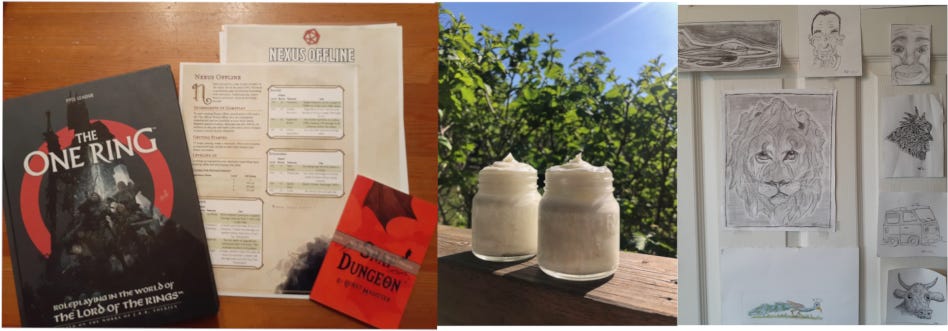
Routine & “Simple and Sane” Schedule
I enjoy being spontaneous, but I have also come to appreciate the benefits of a regular schedule. Having predictability to your day allows you to side-step constant negotiation about when academic tasks happen and when free time begins. It also allows you to have days where you break the routine for a special surprise or a field trip. Here is how our days generally looked like when the kids were younger:
Have a regular get-up time. Do not sleep in and lounge around in sleepwear on weekdays.
Eat breakfast together.
Start the day with a 15-30 min walk outside. Seeing things outside your four walls will help to prepare the brain for learning. If you cannot start the day with a walk, take it mid-morning or before lunch. A walk never fails to lift the mood.
Have a set learning time each day.
Eat lunch together.
Take a regular 1- hour downtime in the afternoon where children do quiet reading, drawing, or listening to audiobooks. No screen time during this downtime.
Involve children in at least one hands-on task once a day. This can be snow shoveling, washing dishes, sweeping the floor, folding laundry, cleaning a bathroom, etc. Having a responsibility, fulfilling it, and seeing concrete results builds self-sufficiency and surprisingly also satisfaction. Contributing to the household and having a role also shows children that they are valued and a needed support in the family.
Importantly: Keep your learning space free from intrusive or unnecessary technology. Place your phone away from you during teaching times. Resist the temptation to check your phone while the kids are working at a task. Be fully present.
In about thirty minutes per day, plus informal teaching as you go about your daily life, you can easily teach your child beginning reading, writing, and math concepts, all without workbooks or teacher’s manuals.
Susan Wise Bauer, author of “The Well-Trained Mind”
When starting out you may feel that you need to “teach” your child for hours each day. But as Susan Wise Bauer points out, teaching the basics can be accomplished in about half an hour.
Here is one possible version of a “simple and sane” schedule for children in Kindergarten/Grade 1:
READING: Teach Your Child to Read in 100 Easy Lessons – We used this classic to teach all three of our children to read. If you would like to start this with a younger child, you can divide the lessons into even shorter chunks of 10-min each. See
’s post on How My Children Have Learned to Read for additional beginning reading ideas.WRITING: Handwriting Without Tears Grade 1 / Handwriting Without Tears Grade 2 This writing curriculum does what it says – no tears here! We used this program for our kids and the instruction was very child-friendly. The instruction is clear, logical, and not overwhelming, and the letters are instructed in a way that a child can easily remember.
MATH: Right Start Math Games – This games set is not a curriculum per se, but it contains 300 card games to be used throughout the elementary years that provide practice in learning the concepts and facts. It includes number sense, addition, subtraction, multiplication, division, money, clocks, and fractions. This can be used with any math program or simply as a way of getting a solid foundation in mental math.
HISTORY: The Story of the World by Susan Wise Bauer Vol. 1 This is a perfect read-aloud for snack time – that is how we have used this history series for years and loved the crafts from the accompanying activity book.
SCIENCE:If you would like to add some natural science into the mix, take one of these guides on your walks and learn to identify flowers, trees, and birds. Peterson First Guide to Birds and/ or Peterson First Guide to Trees and / or Peterson Guide to Wildflowers.
Also:
Do end the lesson with a sense of achievement, however small.
Don’t introduce two new and difficult things on the same day.
Use the “nibbled to death by ducks” strategy when encountering stubborn roadblocks: simply try your hardest at the task for 15 min. each day.
In later years:
While I always used to draw up a specific timetable for each child at the start of the school year, I have found the “checklist” format I adapted from a fellow homeschooler to be the most useful. Each week gets its own sheet and learning tasks get checked off as they go along. Here is an example from Grade 6:
Prompted by a reader question: I created my own Latin/ Greek stems worksheets and quizzes based on Michael Clay Thompson's "Caesar's English". I have shared all my resources as printable pdfs for paying subscribers here (inlcudes flashcards, practice sheets, and quizzes for 100 stems).
Routines and schedules are helpful to provide a backbone to your day and overall school year. Yet, they are not written in stone and can be adapted as necessary. There is a saying that may ring true to many a homeschooler:
“We all start out the year as classical, slowly move on to eclectic Charlotte Mason, and end the year as unschoolers.”
One wonderful aspect of home education is that it is flexible. Take advantage of this, but remember that even a flexible body needs bones to give it support.
If you would like to read more about routines and creating simple&sane schedules, you can change your notifications to receive free posts in the Unconformed Education section here:
The Books
There are three home education books that I return to every year. They were the ones that were recommended to me when I started out, and I still recommend them to new homeschooling families (indeed one is missing in the picture because I loaned it to my neighbour:)
For the Children's Sake: Foundations of Education for Home and School by Susan Schaeffer Macaulay (
is currently leading a read-along here)The Well-Trained Mind: A Guide to Classical Education at Home by Susan Wise Bauer
A Charlotte Mason Companion: Personal Reflections on the Gentle Art of Learning by Karen Andreola
Some more recent discoveries I would add are:
Common Arts Education - Renewing the Classical Tradition of Training the Hands, Head, and Heart by Christopher Hall.
Rethinking School: How to Take Charge of Your Child's Education by Susan Wise Bauer
For a fantastic podcast and videos on classical Charlotte Mason education see The Commonplace with
.If you want to get insights on classical learning, check out
’s How to Think like Shakespeare, Lessons from a Renaissance Education.For an overview of John Taylor Gatto’s “open source” learning see:
General Family and Parenting Books
I have to admit that, apart from the “what-to-expect-type” books, I don’t recall reading much parenting advice. Much of Peco’s and my parenting was informed by our upbringing, education, trust in our faith, and conversations on the couch in the evenings. I thus invited several Substack writers to share their recommendations. The list grew and grew, with many readers adding their favorites. At the end of Letters From the Unconformed Vol. II you’ll find an alphabetized list, along with who recommended the book as well as why.
Note: you can find all of the recommended books in our “Unconformed Bookstore” in the Family and Parenting section here.
The Long Game
Our goal should be to give our children a strong foundation from which they can then grow and thrive. We should fill our homes with goodness and beauty, practice virtuous habits, serve others together, invite people into our homes, associate with different kinds of people, practice good habits of conversation, give our children developmentally appropriate responsibilities, and not let quarrels get in the way of good arguments.
Tessa Carman from How to Grow a Garden in the Technopoly
We need to allow our children the time and solitude they require to develop self-knowledge and support them in pursuing knowledge so that they can have a true form of education.
An unconformed education plays the long game. It is not based on gimmicks and shortcuts. It does not substitute the digital at the expense of the real. It is not automatic, robotic, or like an assembly line, but more like gardening.
Guiding a child along their educational path requires time and patience. In the beginning it will seem like we are helping them to learn to read, to reason, to apply the scientific method, to create, and acquire various skills; and if we are faithful in this we discover that we are not just helping to educate them, but to form them as a whole person.
If we are faithful in the little things, we are faithful in the big things. All this has always been true about education. But the added challenge of our own age, yet also the opportunity, is that in helping children to discover their unique potential, we are also helping them to unmachine their minds and stay human in the fullest sense.
If you found this post helpful (or hopeful), please consider supporting our work by becoming a paid subscriber, or simply show your appreciation with a like, restack, or share!
Please share your comments, experiences, and questions below!
What advice would you add for homeschoolers starting out?
What are your top picks for educational/ homeschool books?
We would love to hear from readers who are pursuing other forms of unconformed education as well! This could include educational choices you are making within your family or in your own life as an adult learner.
Further Reading
Special Guest Edition by Ruth Gaskovski Academic Rigor, Sheep Hearts, and Phone-Free Social Webs: An afternoon at the Classical Homeschool Program on
byHomeschooling for the Common Good by
How My Children Have Learned to Read by
Some Thoughts on Home Schooling by
Why I Left My Professorship to Homeschool My Kids by
Scientific American falsely links homeschooling to abuse by
Homeschooling a Large Family by
How I Plan by
Inside the New Wave of Old-School Education by
inFor insight into Gatto’s educational philosophy, see his famous letter of resignation published in the Wall Street Journal I Quit, I Think.
John Taylor Gatto’s “open source” learning approach accepts that “anything under the sun might be a starting point of self-mastery”. Anyone with something to offer can teach, and it is the students who initiate learning.
This passage is from Wise Bauer’s most recent book Rethinking School.






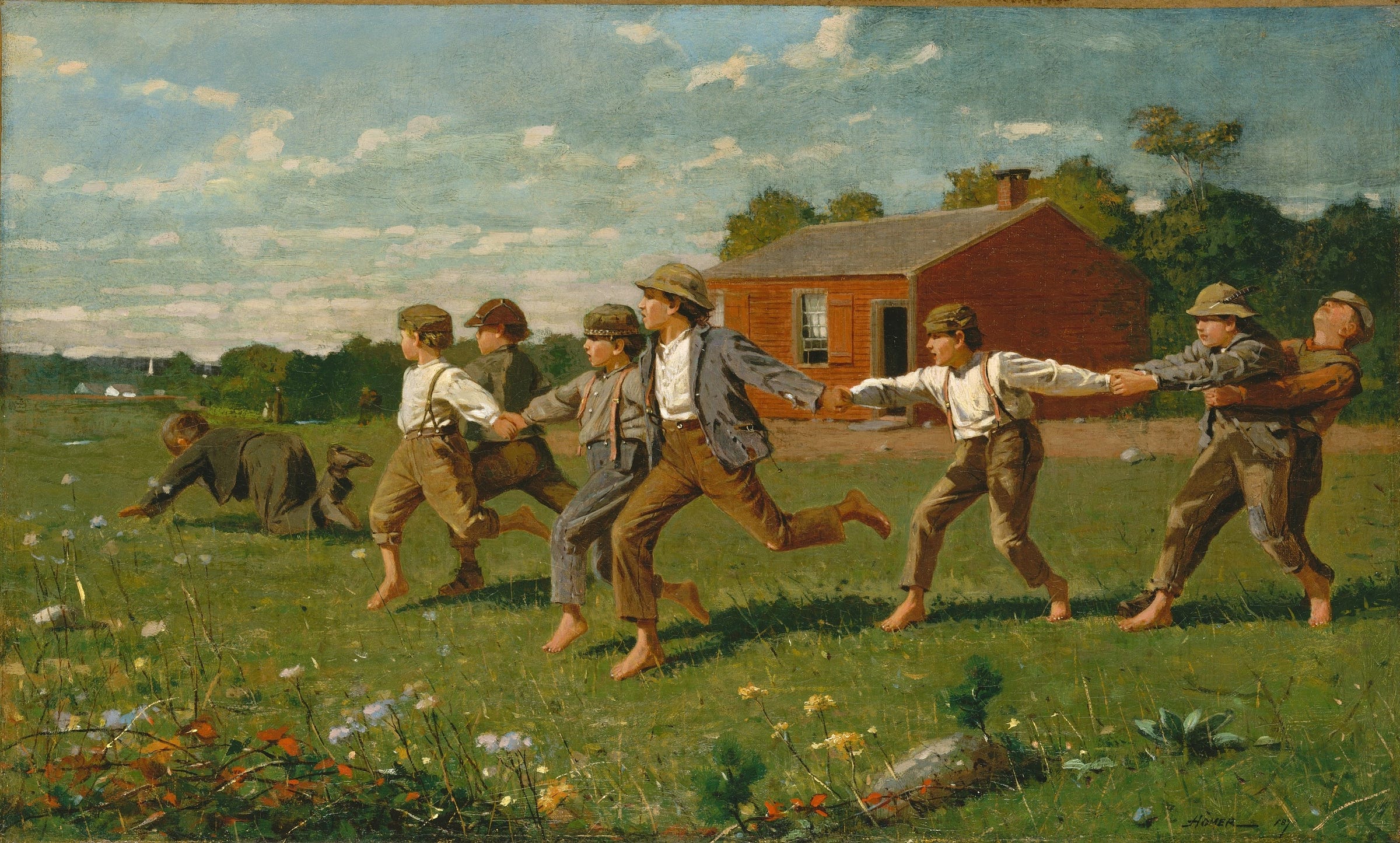
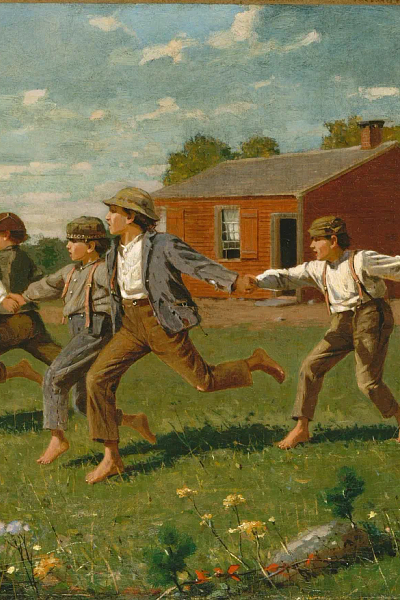
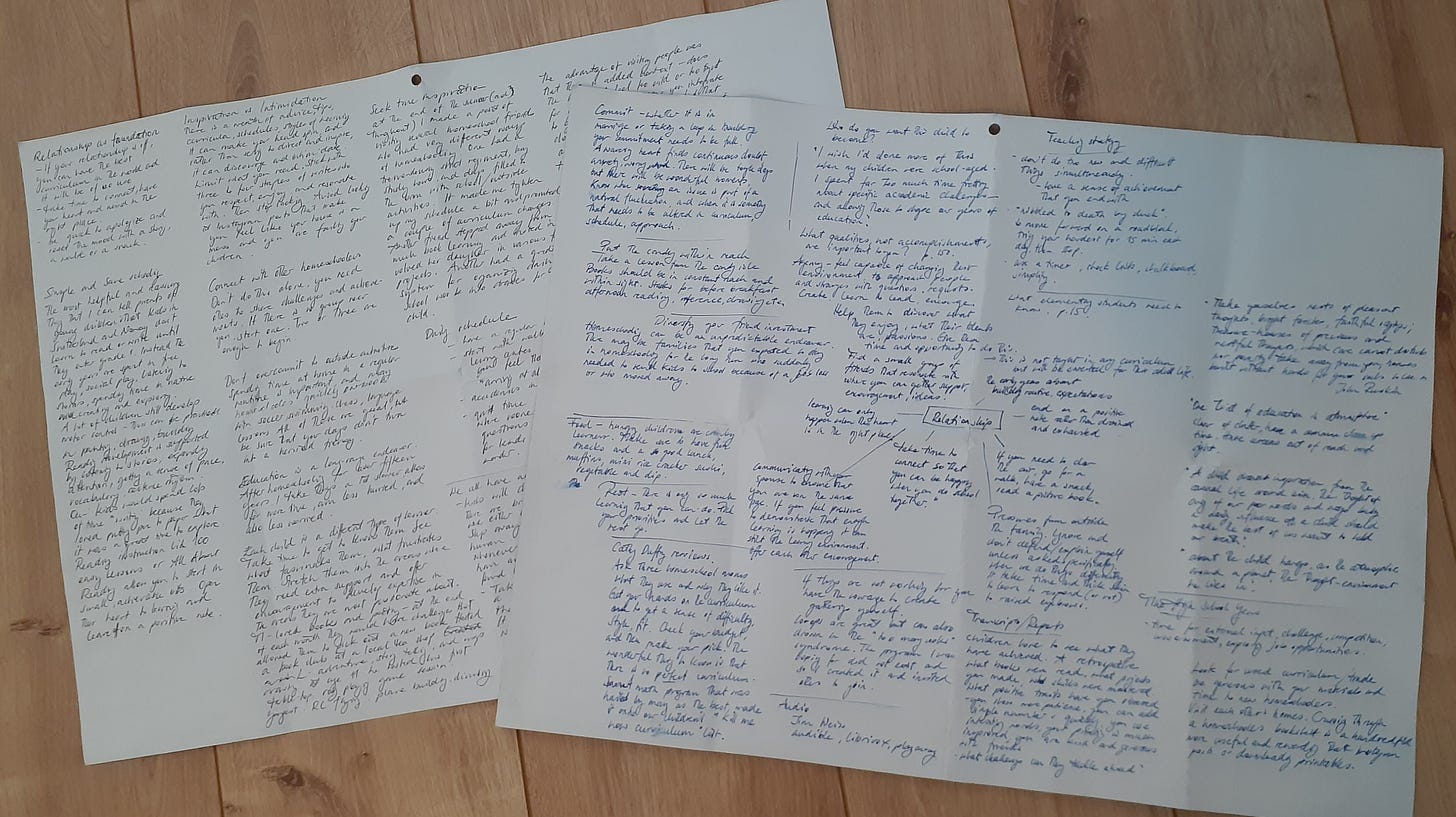
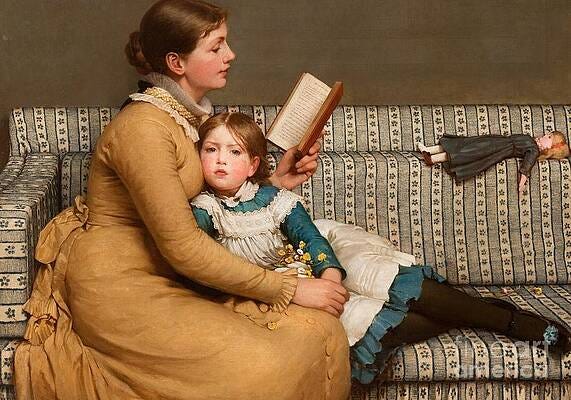
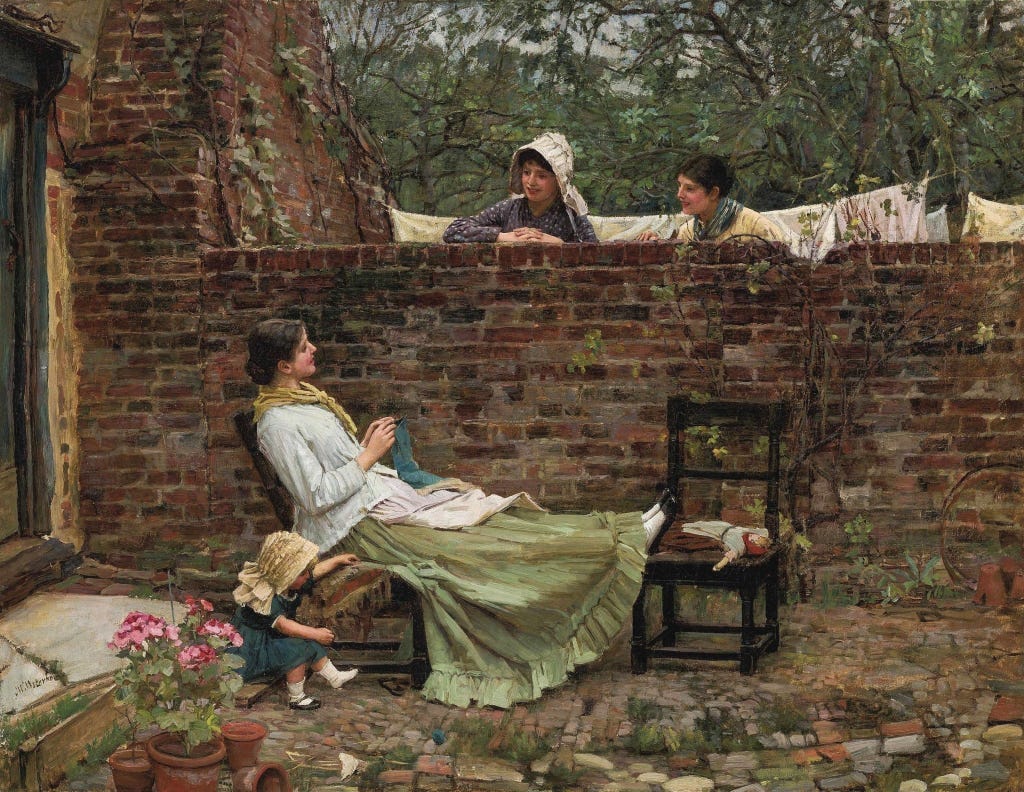
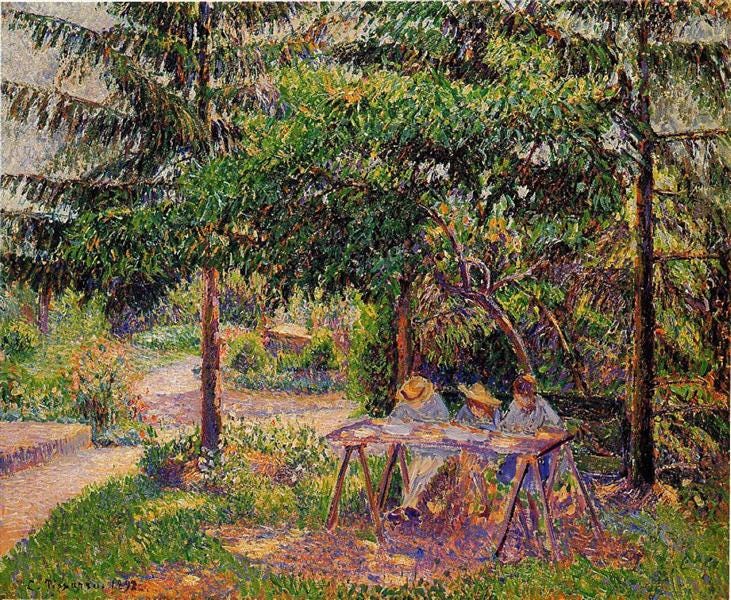
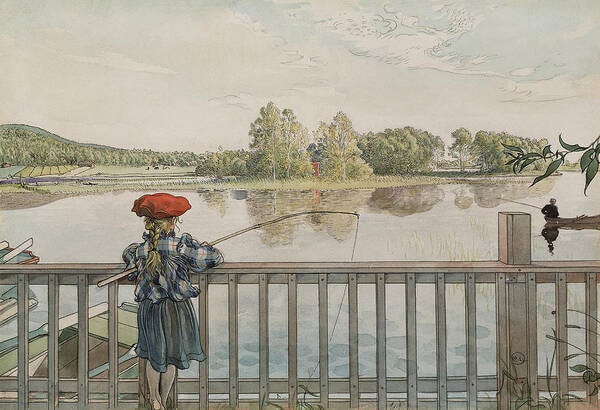
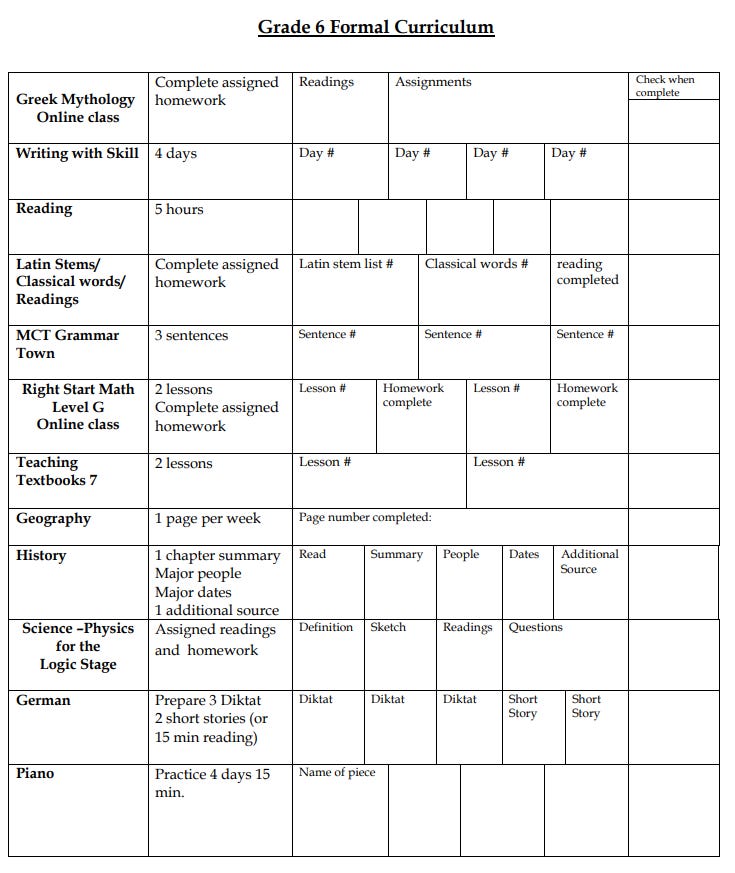
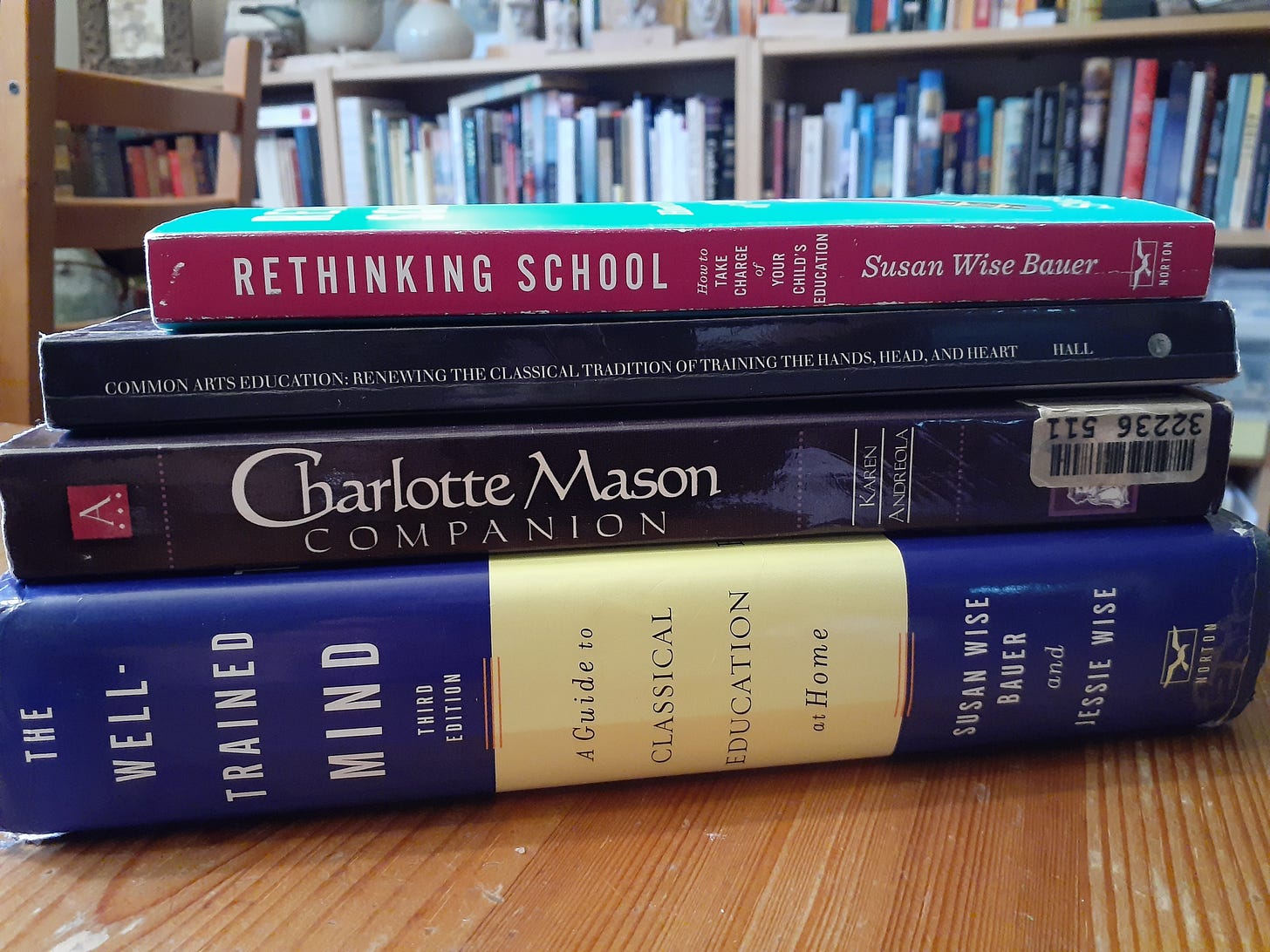
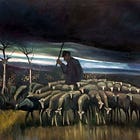

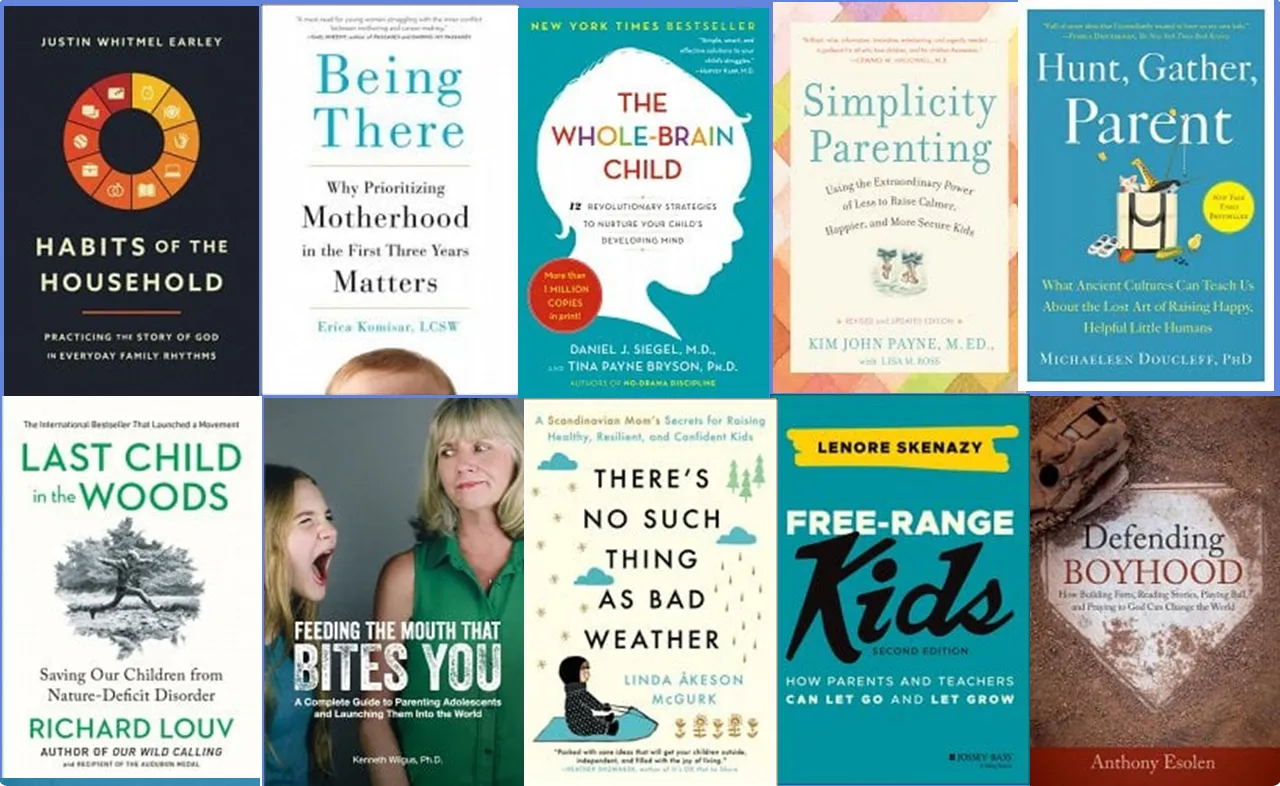


What a lovely essay, Ruth! Thank you for sharing it. One of the most important lessons I’ve learned as a homeschooling mother is that I too learn and grow each year in my teaching abilities. A curriculum or method than would not have been a good fit one year can become something I “grow into” with more experience. As I first started, the heavily scripted curricula that told me exactly what to do were immensely valuable. But as I develop myself, I feel more able to tackle educational methods that ask more of me, the teacher. That seems obvious now that I think of it, but was something I didn’t realize when I began.
This is really enlightening. My daughter is almost 2 and we are still considering what type of schooling options we want for her. I've always been curious how people handle homeschooling their kids — what does the day to day actually look like? I like how you acknowledge that "what it looks like" will vary widely between families (and even kids), working both with the adult's preferences and the child's natural personality.